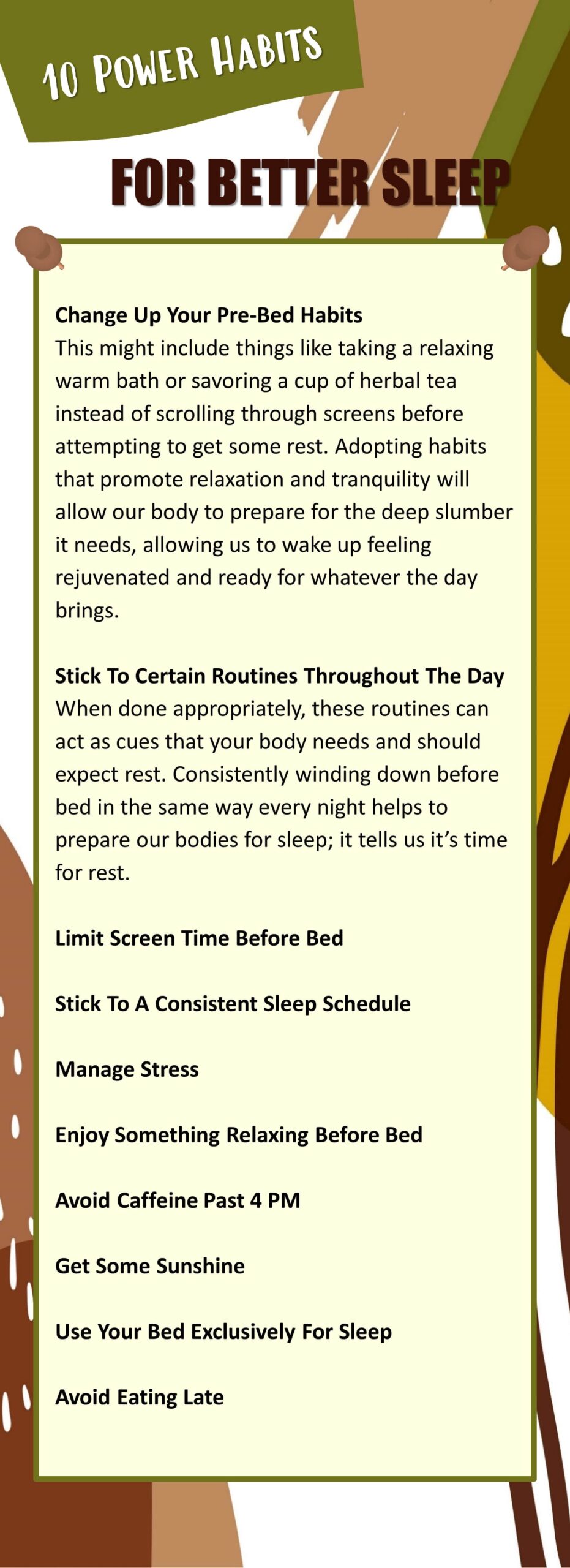Many of us struggle to get enough sleep, but have you ever considered that the way we live our lives could be intersecting with our slumber? Here are 10 ways to transform your nightly routine into one that supports healthier sleep. Invest today in creating good habits around your bedtime so you can enjoy a better night’s rest tomorrow!
1| Change Up Your Pre-Bed Habits
It is impossible to underestimate the importance of a good night’s sleep. While it may seem simple enough, so many of us struggle with getting the restful shut-eye we need for optimal health and performance. In order to improve our sleep routines, one valuable habit we should adopt is to change up our pre-bed habits.
This might include things like taking a relaxing warm bath or savoring a cup of herbal tea instead of scrolling through screens before attempting to get some rest. Adopting habits that promote relaxation and tranquility will allow our body to prepare for the deep slumber it needs, allowing us to wake up feeling rejuvenated and ready for whatever the day brings.
2| Stick To Certain Routines Throughout The Day
Creating and sticking to various routines throughout the day can be a powerful habit for better sleep. When done appropriately, these routines can act as cues that your body needs and should expect rest. Consistently winding down before bed in the same way every night helps to prepare our bodies for sleep; it tells us it’s time for rest.
Developing morning routines too increases alertness as soon as you wake and offers structure to our days moving forward. Driving the same route to work, waking up at the same time every day, or even enjoying hot tea at the same time every day will help ease you into good sleep patterns.
3| Limit Screen Time Before Bed
If you spend time looking at your electronic devices, such as a cell phone, tablet or computer, the blue light these devices emit is disruptive to our natural circadian rhythm and has been linked to insomnia and other sleep disorders. Establishing a routine that keeps screens away from your sleeping space and uses the last hour prior to bed for calming activities like reading can help improve the quality of your sleep.
4| Stick To A Consistent Sleep Schedule
A consistent sleep schedule means going to bed roughly around the same time each night and waking up at the same time each morning, even on weekends, holidays or other days off school or work. Some individuals may benefit from a more customized schedule depending on their own personal daily activities. Regardless, adhering to these regular sleeping habits can create better sleep hygiene which can help improve physical and mental health.
5| Avoid Stressful Situations
Sleep deprivation can significantly impact our physical, mental and emotional wellbeing, yet many of us add additional stressors into our lives without realizing the potential harm it may be causing. Taking control and opting out of activities or commitments that bring on added stress can help reduce the amount of stress in your life and prepare yourself for a peaceful night’s rest.
6| Enjoy Something Relaxing Before Bed
Taking time to enjoy something calming can help your body and mind transition into a resting state as you prepare for sleep. This is often done by participating in activities like reading, listening to music, taking a warm bath or shower, or having some quiet time. This power habit can provide long-term benefits of better sleep when done routinely. Participating in a relaxing activity before bed will help you quickly fall asleep and stay asleep throughout the night so you can wake up feeling refreshed and energized the next morning!
7| Avoid Caffeine Past 4 PM
Caffeine is the most commonly used psychoactive drug in the world – and it can have an impact on our sleep quality if we consume it too late in the day. Many caffeinated beverages such as coffee and energy drinks may provide short-term energy boosts, but they can also negatively affect sleep cycles if they’re consumed too close to bedtime. A good guideline is to avoid caffeine after 4PM, giving your body enough time to clear it out of your system before you attempt to fall asleep at night.
8| Get Some Sunshine
Getting out in the sun for a few minutes each day keeps your body in sync with its circadian rhythms, which control your inner clock and tell you when it’s time to go to bed and wake up. Sunshine also helps produce melatonin, the hormone that helps regulate sleep patterns. A lack of sunshine can lead to decreased energy levels throughout the day and difficulty falling asleep at night.
9| Use Your Bed Exclusively For Sleep
Practicing good sleep habits such as using your bed exclusively for sleep can help you get a better night’s rest. When you only use the bedroom and the bed for sleeping, your body learns to associate being in the bedroom with winding down and preparing for sleep. This mental cue helps trigger a sense of relaxation so that you’re able to fall asleep faster. Setting boundaries between activities like working or scrolling on your phone and going to bed will increase quality sleep.
10| Avoid Eating Late
Eating late at night can have a detrimental impact on your sleep. The human body has an internal clock that dictates when it is ready to rest and digest food, and if you don’t respect those cycles, it can lead to difficulty sleeping. Avoiding meals for several hours before bedtime is a powerful way to start promoting healthy sleep habits.
Going to bed with a full stomach can cause discomfort and indigestion as the body struggles to process the food while trying to rest. Additionally, eating too close to bed can also mean consuming unhealthy snacks which are also not conducive for better sleep. So, try your best to adhere to the golden rule of avoiding eating late at night in order to have better quality of sleep.








